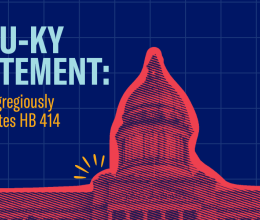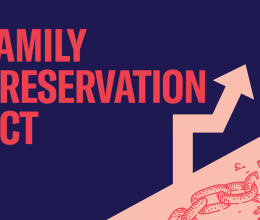
Following the Supreme Court's decision to overturn Roe v. Wade and in the absence of federal abortion protections, the fight to protect access moved to the states. Immediately following the Dobbs decision, we sued in state court, arguing the Kentucky Constitution guarantees the rights to privacy, bodily autonomy, and self-determination.
Abortion Bans Take Effect and the Fight for Abortion Access Moves to the States
As soon as the court released the Dobbs opinion, Kentucky's two remaining clinics stopped providing abortion services out of an abundance of caution, knowing Attorney General Daniel Cameron and other extreme, anti-abortion activists and politicians would claim that Kentucky's "trigger law" went into effect, banning abortion care at all stages of pregnancy.
Alongside Planned Parenthood, we immediately sued in Jefferson Circuit Court, arguing the Kentucky Constitution’s rights to privacy, bodily autonomy, and self-determination protect the right to abortion. We also argued the trigger law violates provisions of the constitution that require the Kentucky General Assembly to put laws into effect themselves. By relying on the Supreme Court to overturn Roe v. Wade, Kentucky lawmakers effectively shifted that authority to the federal judiciary.
Abortion Access Restored
On June 30, 2022, the circuit court agreed with our arguments that these bans violated Kentuckians' rights to privacy, boldily autonomy, and self-determination. Judge Mitch Perry granted a restraining order that temporarily blocked Attorney General Cameron and other state actors from enforcing the bans and allowed both clinics to resume abortion services.
Cameron attempted to undo this victory twice, and lost both times. The circuit court then heard arguments from both sides about the constitutional claims in our lawsuit. Following a full day of arguments and written briefs, the court granted a temporary injunction on July 22, 2022, blocking enforcement of the abortion bans as our lawsuit moved forward.
In his order granting the temporary injunction, Judge Perry also examined other parts of the Kentucky Constitution and found these bans violate even more provisions of the constitution. The court stated these bans violate Kentuckians' right to freedom of and freedom from religion and right to equal protection under the law. In the order, Judge Perry wrote that abortion bans are "distinct" to some faiths, adding that the General Assembly "is not permitted to single out and endorse the doctrine of a favored faith for preferred treatment," calling lawmakers' actions "theocratic policymaking." Additionally, Judge Perry stated abortion bans violate Kentuckians' right to equal protection by providing "no legitimate reason why the woman must bear all the burdens of these laws while the man carries none."
Abortion Bans Take Effect
Cameron appealed the temporary injunction and a single appeals court judge reinstated both abortion bans, forcing both clinics to stop providing care on August 1, 2022. We immediately fought back, appealing to the Kentucky Supreme Court. On August, 18, 2022, the Supreme Court denied our emergency request and scheduled oral arguments for November 15, 2022.
The State of Abortion Access
Abortion is currently illegal in Kentucky at all stages of pregnancy. If you or someone you know is seeking abortion care, visit AbortionFinder.org and AbortionFunds.org. Both organizations provide information about accessing legal care out of state and how to seek assistance with costs, transportation, navigating the healthcare system, and more.
Motion to Dismiss
On June 20, 2023, the American Civil Liberties Union of Kentucky, ACLU, PPFA, and PPGNHAIK today filed motions (linked here) to dismiss the case EMW v. Daniel Cameron. In response to the filing, the groups issued the following joint statement:
“We moved to dismiss this case because earlier this year, the Kentucky Supreme Court issued an extraordinary ruling that took away health care providers’ ability to defend the rights of their patients, upending decades of precedent. Bringing cases on behalf of patients has been standard practice in Kentucky and across the country for good reason — numerous obstacles stand in the way of patients coming forward to participate in litigation.
“We remain open to hearing from patients who are in Kentucky and need to access an abortion; those patients can pursue a challenge to the complete ban and six-week abortion ban and help restore abortion access in the Commonwealth. If you are in Kentucky, seeking an abortion, and want to know more about possibly being a plaintiff in a lawsuit like this, our phone lines are open for them to give us a call or text us at (617) 297-7012.”



